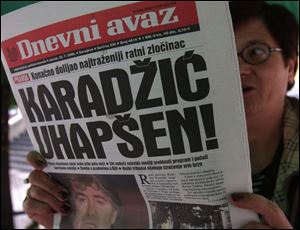
Serbian judge orders Karadzic to UN tribunal
7/22/2008
A Bosnian woman reads the Bosnian daily newspaper, headlined "Karadzic arrested" and showing a photograph of Bosnian Serb leader Radovan Karadzic on the front page, in Sarajevo, Bosnia, on Tuesday.
BELGRADE, Serbia - A judge has ordered ex-Bosnian Serb leader Radovan Karadzic handed over to the U.N. war crimes court to face charges of genocide and other atrocities against Muslims and Croats in his country, a Serbian prosecutor said Tuesday.
Karadzic has three days to appeal the ruling that would send him to the tribunal in The Hague, Netherlands, Serbian war crimes prosecutor Vladimir Vukcevic said. Karadzic's lawyer Sveta Vujacic said he will appeal the order.
Karadzic, 63, was arrested Monday night in a Belgrade suburb after a decade on the run, officials said at the news conference Tuesday. Accused of masterminding the deadly siege of Sarajevo and the 1995 massacre of up to 8,000 Muslims in the Bosnian enclave of Srebrenica, Karadzic had topped the U.N. tribunal's most-wanted list for more than a decade.
Karadzic disguised by a mane of white hair and glasses managed to move freely while living in a new part of Belgrade and even practiced alternative medicine at a private clinic, Serbian government official Rasim Ljajic said, displaying a photo of the war crimes suspect.
Karadzic's whereabouts had been a mystery, with his hideouts reportedly including monasteries and mountain caves in remote eastern Bosnia.
Serbian security services found Karadzic while looking for another top war crimes suspect, Gen. Ratko Mladic, Ljajic said.
"He was arrested Monday evening near Belgrade while changing locations," Ljajic said.
Ljajic said Karadzic once known for his distinctively coifed hairdo was unrecognizable with his long mane, beard and glasses.
"His false identity was very convincing," Vukcevic said. "Even his landlords were unaware of his identity."
The charges against Karadzic, last amended in May 2000, include genocide, extermination, murder, deportation, inhumane acts, and other crimes committed against Bosnian Muslim, Bosnian Croat and other non-Serb civilians in Bosnia during the 1992-1995 war.